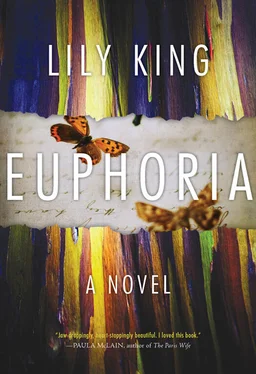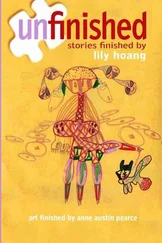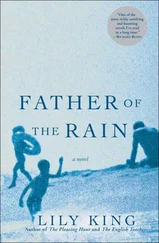‘What were you doing just now, with those cards?’ I asked.
‘Ink blots.’
‘Ink blots?’
My ignorance amused her.
She weaved, and I followed, through the tangle of legs and all her equipment to the large mosquito room. The desk closest to us was layered in papers and carbons, notebooks and file folders. There were a few books open near the typewriter, with sentences underlined and notes in the margins, a pencil resting in the crease of one of them. The other desk was empty save for a typewriter still in its case, and no chair to sit in. I would have liked to sit at the messy desk, read the notes and the underlinings, flip through the notebooks and read the typed-up pages in the folders. It was a shock to see someone else doing my work, in the midst of the very same process. As I looked at her desk, it seemed a deeply important endeavor to me, though when I looked at my own it seemed close to meaningless. I thought of how she had gone straight to my workroom in Nengai, how respectful, almost worshipful, how she’d wanted to help me solve the puzzle of the mango leaves.
She’d realized her hair was floating in the humid human air, and she hurried to plait it back behind her, tying it off with a rubber band in one quick gesture. I could now see the tall stalk of her neck. She handed me the top card in a small stack. It was exactly that, a blot of ink, a mirror image of nothing in particular on either side of the center, though it was not homemade and there was no crease down the middle.
‘I don’t understand.’
‘They’re Fen’s, from when he studied psychology.’ She smiled now at my confusion. ‘Sit.’
I sat on the floor and she sat beside me and pointed to the big black smudge with its identical sides. ‘What does this appear to be?’
I didn’t think ‘nothing’ would earn me high marks so I said, ‘Two foxes fighting over an urn?’
Without comment she flipped to the next one.
‘Elephants in large boots?’
And the next.
‘Aren’t you supposed to refrain from smirking at your patient?’ I said.
She forced her lips down. ‘Not smirking.’ She jiggled the card at me.
‘Hummingbirds?’
She put the cards down. ‘Holy crow. You can take the man out of biology but you sure can’t take the biology out of the man.’
‘That is your complete diagnosis, Herr Stone?’
‘That is my observation. The assessment is a bit more unsettling. Highly and disturbingly abnormal. Elephants in large boots?’ She laughed, hard. I laughed too, and a lightness came over me. I felt as if I could float up to the ceiling.
‘How could these possibly be useful here?’ I said.
‘I find that most anything can shed a little light on the psyche of a culture.’
The psyche of a culture. I nodded, but I wondered what she thought that meant. I wished we could sit alone with a cup of tea and discuss it, but her work was through the mosquito net and I didn’t want to disrupt her morning any more than I already had. ‘May I observe you with them?’
‘Bani is preparing us food. You must be hungry. I’ll do two more interviews then we can go find Fen. He’ll be glad for a proper lunch.’
She sat back down in the same corner spot beside her notebook and called a woman named Tadi over. I settled against a beam a few feet away. The cards were like everything that has spent time in this climate: faded, fraying, damp, and molding. Each card had the same dent at the bottom in the middle where she held it between her thumb and first two fingers, waiting for a response. And it was a long wait. Tadi stared hard at the card with the foxes holding the urn. She had seen neither a fox nor a Greek urn, so she was stumped. She stared with exaggerated concentration. She was a large woman, a mother of many children by the look of her long nipples and stretched stomach skin, which lay in neat folds like a stack of bedsheets in my mother’s linen closet. She had only three fingers on her left hand and four on her right. She wore little decoration, just a thin tulip bark ribbon around a wrist with a single cowrie shell strung through it. Like the other women, she had a shaved head. I could see the quiver of her pulse in a vein on her crown. And when she caught me looking at her, she held my gaze for several seconds before I looked away. The only Kiona females who had ever looked me in the eye were the very young and the very old. For the rest it was taboo. Nell lowered the card and Tadi blurted out something, koni or kone. Nell wrote it down and held up another.
After Tadi came Amun, a boy of eight or nine with a wide smile. Amun looked all around to see who was watching and then he said a word that made his friends laugh and the elders scold him. Nell wrote down the word but was not pleased. Even before she lifted the next card he shouted out another naughty word and she quickly called over a woman who was smoking Fen’s Dublin pipe to take his place. Amun crossed the room and draped himself in the lap of a girl who shifted but did not stop her mending of a fishing net to receive him. Nell had the woman, just like the rest, sit right beside her, and she showed her the cards like they were looking at a magazine together.
Their boy Bani brought me a cup of tea and a mound of biscuits. I thought it was far too many until nearly every child in the room leapt up and hovered round me making identical moaning sounds. I broke the biscuits in as many pieces as I could and passed them around.
When she was done, Nell stood up and shooed them all out quite unceremoniously, paddling her hands toward the door. On their way out they put everything back in boxes and the boxes back on the shelves, and within minutes the house was put to rights and the floor was shaking from all the feet going down the ladder.
‘You have quite a system.’
Though she was looking at me, she hadn’t heard. She was still with her work. She was wearing a tulip bark ribbon, too, just above her elbow. I wondered what they made of this woman who bossed them around and wrote down their reactions. It was funny how it all seemed more vulgar watching someone else do it. I felt like my mother, with this sudden distaste for it. And yet she was good at it. Better than I was. Systematic, organized, ambitious. She was a chameleon, with a way of not imitating them but reflecting them. There seemed to be nothing conscious or calculated about it. It was simply the way she worked. I feared I’d never shake my Englishman Among the Savages pose, despite the real respect I had come to feel for the Kiona. But she with only seven weeks under her belt was more of the Tam than I ever would be of any tribe, no matter how long I stayed. No wonder Fen had grown discouraged.
‘Let me just put these back,’ she said, holding up the cards and her notebook. I followed her, wanting to see her workroom again, not wanting to miss a step of her process.
She put the cards on a shelf and the notebook beside it. ‘Sorry. Hold on,’ she said, and flipped open the notebook to add a few more thoughts.
Behind her, on the bottom shelf, were over a hundred of these notebooks. Not fresh ones, but battered ones. A record of all of her days since July of 1931, I imagined. For some reason I felt ill again, hot, with a spray of lights dancing at the edge of my vision. I didn’t want to vomit onto her notebooks. I stepped back and heard myself ask a question.
‘In the mornings,’ she said, but I was no longer sure what I had asked. She described her afternoons visiting all the houses on the women’s road. She said she also visited two other Tam hamlets nearby. I asked if she went alone.
‘There’s no danger.’
‘I’m sure you heard about Henrietta Schmerler.’
She had.
‘She was murdered.’ I was trying to be delicate.
Читать дальше











